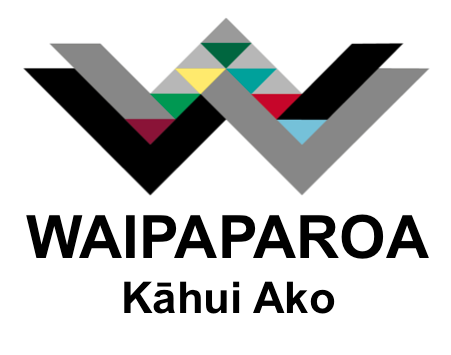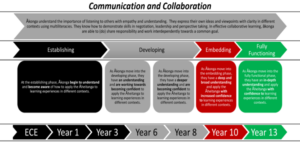
Over the last four years, the Waipaparoa Kāhui Ako has spent time creating the Āheitanga framework for developing ākonga capabilities that are too important to leave to chance. The continuation of this achievement challenge will allow each school to continue to embed Āheitanga into their own learner profiles and/or key competencies. Schools are exploring ways to explicitly teach the skills and capabilities in their everyday teaching now that the matrices have been introduced and adapted to meet their needs. In this Achievement Challenge, we will assess the impact of Āheitanga on student learning and well-being, understand best practices in the assessment of capabilities, and how this develops in each school. Ākonga wellbeing continues to be a focus for this achievement challenge along with ensuring that we build understanding of Āheitanga for all stakeholders in the Waipaparoa community.
The matrices were created 2021-2023 for across school use (see links below).

Cultural and Social Responsiveness

Communication and Collaboration


Adaptive and Productive Thinker
To assess Āheitanga capabilities by gathering information from ākonga at the transition points.
To understand the assessment of Āheitanga in each school and share best practices.
To ensure community understanding and engagement in Āheitanga to support their tamariki at home.
To share progress and best practices from each school.
To create two videos and accompanying resources that explain and support Āheitanga, sharing a common language and understanding and showing the connectedness across our Kāhui Ako.
The Waipaparoa Kāhui Ako schools have a strong desire to connect with and build meaningful and authentic relationships with our local iwi, Ngāi tai ki Tāmaki. We want to ensure that our ākonga develop their understanding of our local history as well as making connections to Ngāi tai ki Tāmaki, acknowledging the continuing importance of the original inhabitants of Aotearoa. To envision an inclusive and connected future, we need to understand the history between our schools, the local iwi, and the local marae. We know that in building our bicultural competence, our ākonga from multicultural backgrounds will also benefit.
All schools within the Kāhui Ako have a focus on Culturally Responsive Practice as part of their strategic plan, it is a Ministry requirement. As part of this goal, it is essential that all schools are honouring the Te Tiriti o Waitangi. To ensure the three principles of protection, participation, and partnership are shared with teachers and learners. We all have a responsibility to ensure Māori are respected and given equal footing to the tikanga and taonga of other cultures and to engage with our iwi when we plan work that affects them. As schools strategically plan for their learners this will bring progress and achievement will be seen across the curriculum.
To connect with and build meaningful and authentic relationships with Ngāi tai ki Tāmaki.
To develop ākonga understanding of our local history.
To develop a culturally responsive practice with Kaiako across the Kāhui Ako.
To host and develop a kapa haka performance amongst our Kāhui Ako.
To give back to Umupuia in ways that are needed.
Literacy standards remain at the forefront for each school across the Waipaparoa Kāhui Ako as strong literacy skills are key to learning. With the introduction of Te Mātaiaho | New Zealand Curriculum Refresh, there is a shift towards a more structured literacy approach in primary schools, and NCEA’s new literacy co-requisites in secondary schools. Both teachers and students require support to ensure high levels of literacy are maintained and student progress is accelerated to achieve improved outcomes.
To visit schools to gather data on processes, strategies, or programmes that are being implemented and the impact of these on student outcomes.
In order to raise the achievement of students, we will build teacher capability to accelerate literacy progress with all students.
To build an understanding of the NCEA literacy co-requisites – implications for teaching literacy in primary and intermediate schools.
To create a working literacy committee to share best practices.